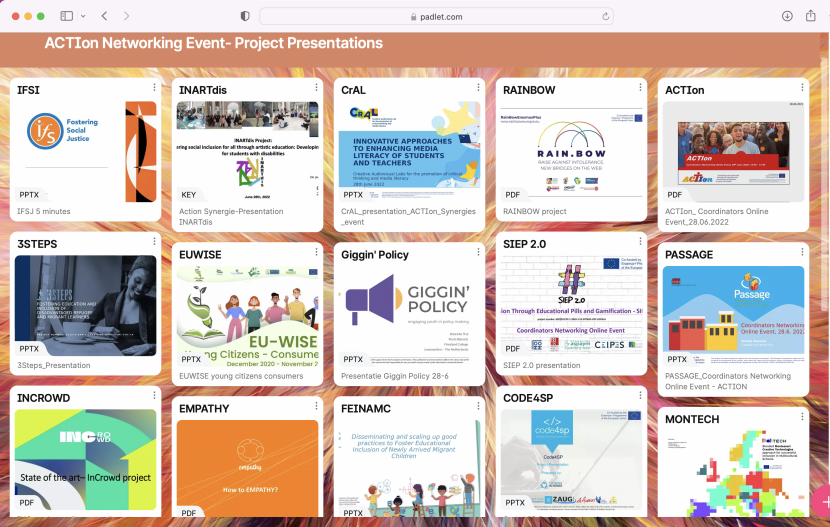The Synergies event with project coordinators was a success!
On 28th June in the afternoon, ACTIon hosted the online event for coordinators of Erasmus+ Social Inclusion projects. The event gathered 31 coordinators representing 28 projects. Additionally, the meeting was attended by four representatives of the ACTIon project team and one project officer from the EACEA team. Participants came from 13 different countries: Spain, Italy, Belgium, Greece, the Netherlands, Bulgaria, France, Latvia, Lithuania, Poland, Portugal, Romania, and Slovenia, and have one thing in common – they are currently running a project in the field of social inclusion through education, co-funded by the Erasmus+ call KA3 from 2020.
At the beginning of the event, participants participated in a warm-up “get-to-know-each-other” session by answering several questions via the tool Mentimeter. They identified the key words of their project. Nearly 90 different keywords emerged – the most common among them were social inclusion, network, education, participation. Media literacy, critical thinking, digital citizenship and democracy also had a prominent presence. At the same time, less common keywords such as crowdfunding, bottom-up policy making, ethnic peer mentoring, fair trade, emotions, gamification, and co-working spaces also appeared. This confirmed the richness and power of educational projects on many different levels and aspects.
Then, participants were divided into 4 different break-out rooms according to the main focus of their project:
– Digitalisation/media literacy/art
– Employability/environment
– Active citizenship/participation/policy reform
– Migrants/minorities/bullying
In the groups, each coordinator presented their project. Then, participants discussed possible synergies. They discovered that all projects work on key competences (digital competences, cultural competences, inclusion competences, transversal competences) and have similar structure research, design, testing, validation, dissemination. This gives space to sharing both thematic, as well as methodological expertise. Projects can also coordinate at the level of dissemination by organising joint events, for example. An interesting idea emerged – to invite other project coordinators to project meetings as external observers/advisors.
The second round of group work in break-out rooms focused on specific topics relevant to all projects:
1) Methodology and Implementation
2) Impact Assessment
3) Transfer und Influencing Policy
Results from the discussions are recorded in padlet. In ACTIon, we believe that this was just the beginning of a fruitful collaboration with other project coordinators and we are looking forward to the next occasion to meet and work together, hopefully in a face-to-face mode.
Download the detailed report from the event here.

No Comments